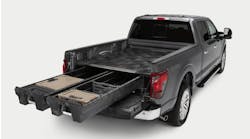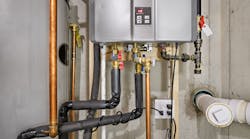Latest from Hydronics & Radiant
Sponsored
Tankless Manufacturers React to Proposed Water Heater Efficiency Standards
As reported in CONTRACTOR’s August print edition, on July 21st the Department of Energy proposed new energy efficiency standards for residential water heaters. The proposal would require the most common-sized electric water heaters to adopt heat pump technology, and gas-fired instantaneous water heaters to adopt condensing technology.
Significantly, the standards would demand 91% efficiency from most tankless water heaters, while traditional tank-type heaters would only be required to increase their efficiency from 65% to 70%.
These standards, which would take effect in 2029 if finalized, are estimated to save Americans approximately $198 billion in energy costs, while reducing 501 million metric tons of carbon dioxide emissions cumulatively over the following 30 years. Water heating is responsible for roughly 13% of both annual residential energy use and consumer utility costs. DOE last updated residential water heater efficiency standards—which are required by Congress—in 2010.
CONTRACTOR interviewed representatives from several tankless water heater manufacturers to gauge the industry’s reaction.
Rinnai
“As currently drafted, DOE’s proposed rule will create an uneven market that effectively bans an already energy efficient product and puts American jobs at risk,” said Frank Windsor, president of Rinnai America.
Windsor is of the opinion that the proposed standards are the result of a bad compromise, and that non-condensing, gas-fired tankless still has an important role to play in the overall carbon-reduction equation.
“The tankless water heater is the most efficient way to heat hot water with a gas appliance and a non-condensing category is an important piece, because it's basically the opening price point,” Windsor said. “It gets the middle-class consumer into tankless technology and it also gets a large portion of the country South of the Mason Dixon line into the technology because of the warm water temperatures.
“So from our view, make the modifications on electrification, make the changes that you want to tank, but keep the non-condensing, because it's already at a 80% efficiency and above. Then allow the consumer—when they go to tankless— to decide for themselves, do I want non-condensing or condensing? Don't take that choice away from the consumer.”
Rinnai has set up a page on the company website that allows consumers opposed to the new standards to quickly and easily contact their Senator, Representative or the DOE:
https://www.rinnai.us/tankless-water-heater-doe-ruling#/2/
“We've had over 6,000 people visit our website and send letters to their local Congress people along with the Department of Energy, voicing their displeasure to this choice,” Windsor said.
Noritz
“Noritz supports the Department of Energy’s efforts to reduce our nation’s carbon footprint. Water heater manufacturers have been actively involved in that effort for years, yet we know there is still work to be done,” the statement read.
“However, at Noritz, we are puzzled that the DOE would—at this stage—want to eliminate non-condensing tankless water heaters rather than conventional, non-condensing storage-tank units found in most American homes today. After all, the energy efficiencies of these tank units are substantially lower than that of non-condensing tankless water heaters—on the order 60% versus the 80%+ efficiencies offered by most non-condensing tankless models.
“We strongly believe that 80%-efficient tankless water heaters still have a great many worthwhile uses, offering sustainable, green-building solutions to specific trending applications, such as accessory dwelling units (ADUs), tiny homes and many more.
“For that reason, Noritz hopes the DOE and other governmental bodies will reconsider their proposal in favor of retaining non-condensing tankless technology as a still-effective means of reducing the carbon footprint of many more American homes.”
A. O. Smith
“We don’t think the new regulations are overly burdensome, especially with the goals in mind: electrification, decarbonization, overall energy efficiency,” said Isaac Wilson, A. O. Smith senior product manager for tankless water heaters.
“We may have some proposals in the future, slight, minor changes or updates. But, overall, we feel that the regulations are in line with our expectations, and we don’t feel they are overly burdensome for our industry,” Wilson continued. “Most, if not all tankless manufacturers right now already have products that meet the new standard. I understand concerns that there might be a disruption in the marketplace for replacement scenarios, but really that’s the only potential issue, and even that, by itself, is not an undue burden in most cases.”
Rheem
"Rheem is currently conducting a thorough review of the Department of Energy's proposed energy conservation standard for consumer water heaters. While we do have some inquiries and comments about the proposed rule, we generally find ourselves in favor of the proposed standards. Given the evolving market demand for water heaters, manufacturers will direct their efforts towards investments and innovations to align with these standards.
"It's worth mentioning that Rheem holds a different perspective on the potential impact of the proposed standards on consumer choice. As a leading manufacturer of gas, electric, and tankless water heaters, we view the proposed Rule as a means to drive technological progress and substantial benefits for consumers. The Rule's enforcement takes effect in 2029. Rheem remains committed to developing a diverse range of energy-efficient and sustainable water heating solutions tailored to consumers' varied needs."
Intellihot
"Buildings account for about 40% of all US energy consumption and a similar proportion of greenhouse gas emissions. As we have all witnessed in recent years the effects of global warming have dire consequences on all of us. The DOE draft rule will force the hand of many manufacturers to invest in development and manufacturing of safe, effective and cost-conscious products. Which is already the status quo at Intellihot. We are in favor of the US Government taking decisive action against climate change."
Steve Spaulding | Editor-inChief - CONTRACTOR
Steve Spaulding is Editor-in-Chief for CONTRACTOR Magazine. He has been with the magazine since 1996, and has contributed to Radiant Living, NATE Magazine, and other Endeavor Media properties.







